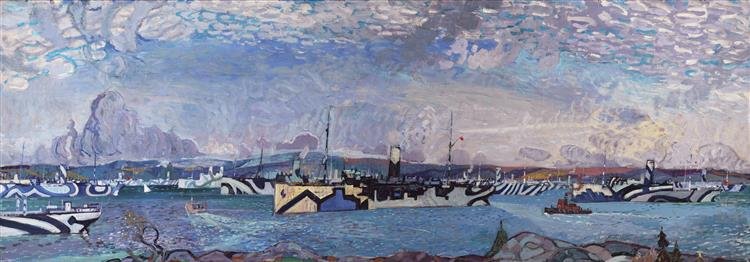Arthur Lismer (1885-1969)
Arthur Lismer, Convoy in Bedford Basin, 1919, Oil on canvas.
Arthur Lismer was born on June, 27, 1885 in Sheffield (UK) and died on March, 23, 1969 in Montreal, Canada. As an immigrant, he was captivated by the Canadian landscape. Thus, from 1920, he was a member of the Group of Seven, and had a goal to create a new Canadian art that embodied the spirit of the nation through its natural scenery. Lismer, before becoming a full time painter was a visionary teacher.
As a teacher, in 1919, he became vice-principal of the Ontario College of Art. Then, in 1927 he became a supervisor of education at the Art Gallery of Toronto. He became a prominent figure in child art education, working in Toronto, South Africa, New York, and Montreal, where he relocated in 1940. From 1940 to 1967, he taught at the Art Association of Montreal (now the Montreal Museum of Fine Arts).
Arthur Lismer had a complete different style than his co-members of the Group of Seven:
Lismer's style evolved to incorporate a more robust and dramatic use of color and form, often with a dynamic, almost turbulent quality. His brushwork and compositions set his works apart with a distinctive vigor and expressiveness.
He was a strong advocate for the role of art in society and the importance of nature, not only in artistic inspiration but also in education and personal development. He believed in the therapeutic and educational value of nature, which he integrated into his teaching philosophy.
While many Group of Seven members are renowned for their landscapes, Lismer had a notable focus on marine subjects. His paintings often depicted harbors, ships, and the rugged coastlines of Canada, especially those of Nova Scotia and British Columbia.
Arthur was an official war artist during World War I, and his experiences and works from this period are a crucial part of his legacy. His depictions of warships and military activities added a different dimension to the predominantly nature-focused oeuvre of the Group of Seven.







